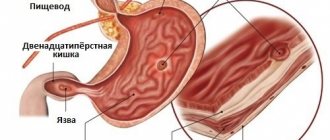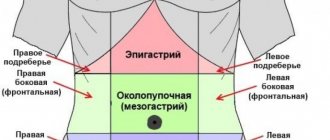Symptoms of the disease
The acute form of gastritis is characterized by sharp attacks of pain below the chest . It usually starts some time after eating (if you ate something spicy, fried, or fatty).
Associated symptoms are nausea and heartburn . After a certain period of time, the pain attacks stop. It is important to start treatment on time - this guarantees recovery.
But if you ignore the symptoms, put off going to the doctor and do not start treatment, acute gastritis becomes chronic . This form of the disease is characterized by periodic attacks of pain : it either passes or worsens. Pain can occur either immediately after eating or some time after eating.
Smokers are prone to illness with increased levels of acidity. The symptoms of chronic gastritis are not very active, and attacks mainly occur during overeating, alcohol abuse, in case of long breaks between meals, smoking, and also in stressful situations.
Symptoms and diagnosis
Gastritis has certain symptoms that cannot be confused with anything else. There is aching pain in the upper abdomen. They are often accompanied by belching or heartburn. In rare cases, smokers may suffer from:
- nausea;
- flatulence;
- abdominal bloating;
- constipation.
Sometimes the course of the disease is accompanied by increased or decreased appetite.
With the chronic type of gastritis in a smoker, the signs are not so obvious. Symptoms occur only when provoking conditions appear. Such factors could be:
- severe overeating;
- malnutrition;
- disrupted diet;
- low quality products;
- excessive alcohol consumption.
For diagnosis, examinations are carried out, the acidity of the stomach is measured, and the presence of Helicobacter is checked.
Is it possible to smoke with gastritis?
Smoking is strictly prohibited if gastritis is diagnosed or its symptoms appear.
If the patient continues to smoke during the treatment of the disease, this negatively affects the entire process. Treatment may be delayed or may not occur at all.
Smoking, subject to all other indications of the attending physician, neutralizes the results . Smoking reduces the effectiveness of medications ; medications may not work at all.
How to quit smoking?
Smoking is primarily a psychological disease. If you want to quit smoking, you need to enlist the support of loved ones with whom you spend a lot of time. Relatives and friends will always be nearby and help you quit such a bad habit as smoking. In this situation, the main thing is support.
Some people who want to suddenly quit smoking are worried that contraindications may arise in the future. But what can happen to a person who has stopped breathing smoke? Gain strength and patience and say goodbye to this bad habit forever. The only thing you may experience after quitting cigarettes or hookah is irritability. Everything can be fixed if you find some new hobby for the soul and completely take your mind off cigarettes. In just a month, this feeling will leave you, and you will again become a free and healthy person.
The effect of smoking on the gastrointestinal tract
When you inhale tobacco smoke, nicotine enters the human body. It spreads through the blood to all parts of the body. It also gets into the stomach. Nicotine leads to vasoconstriction and spasms . Accordingly, in a section of the digestive system where there is already inflammation, this causes serious damage.
It is worth noting that when smoking, tar enters the oral cavity. Mixing with saliva, they enter the gastrointestinal tract. This leads to irritation of the mucous membranes of the stomach .
Tobacco smoke stimulates the production of hydrochloric acid . It should be in the stomach, as it is involved in the process of digesting food, but exceeding the permissible norm leads to damage to the walls of the organ. This phenomenon is extremely dangerous for people suffering from high acidity. Serious consequences can occur due to increased concentrations of hydrochloric acid.
Does smoking affect gastritis?
Tobacco smoking contributes to the occurrence and progression of inflammation of the gastric mucosa. The intake of nicotine into the body stimulates the production of hydrochloric acid. In response to this, hyperplasia and hyperfunction of the parietal cells of the mucous membrane occur. Smoking during gastritis disrupts gastroduodenal motility and interferes with the normal process of mucus formation.
In addition, bronchitis and emphysema, which progress due to smoking, cause hypoxia (oxygen starvation) of the gastric mucosa. This causes its morphological change, in which Helicobacter pylori begins to actively multiply and causes inflammation.
Nicotine provokes increased salivation and excess secretion of gastric juice. It increases muscle spasms of the stomach and spasms of its blood vessels. These phenomena are considered prerequisites for ulceration of the mucous membrane of this digestive organ.
What processes does smoking cause in gastritis? When you take a drag from a cigarette, the muscle tone of the gastrointestinal tract decreases within 15 minutes. Normal contractility, and with it motor skills, return only after 20–30 minutes. This disrupts the process of digesting food.
Nicotine also causes spasms in the inlet and outlet of the stomach. Food lingers in it for a long time, which is accompanied by a feeling of fullness, nausea, vomiting and belching with a rotten smell.
Thus, the development of gastritis from smoking is caused by the following pathological phenomena:
- the direct effect of nicotine on the autonomic nervous system - it disrupts the innervation and tone of the stomach muscles (interruptions in contractile activity are accompanied by spasms, food retention, and reflux);
- exposure to components of tobacco smoke on the mucous membrane when swallowing saliva (an irritating factor);
- indirect effect of tobacco through the spread of infection from the oral cavity (stomatitis and gingivitis associated with cigarettes) through the esophagus into the stomach cavity.
What happens if you smoke with gastritis?
The first symptoms of the disease begin to appear in smokers whose experience is more than 5 years . They are concerned:
- heartburn,
- stool changes,
- bowel dysfunction,
- attacks of pain at night.
If a person has already suffered several attacks of acute gastritis, then the same symptoms will appear after six months of smoking.
If the experience of using tobacco has exceeded 7 years , then problems with the secretion of gastric juice appear, its volume decreases due to atrophy of the gastric glands. Because of this, the main symptoms of the disease are:
- feeling of heaviness after eating food,
- periodic constipation,
- feeling of nausea.
With further “neighborhood” of nicotine and disease, lack of treatment, the risk of developing ulcers and cancer of the gastrointestinal tract increases.
In most cases, the situation is aggravated by poor nutrition and lack of eating habits. This leads to the development of gastroduodenitis .
Likely consequences
If you have gastritis, smoking should be completely prohibited. Its harmful effect on the gastrointestinal tract begins in the oral cavity.
- Gastritis usually appears gradually in smokers. First, the main functional capabilities of the organ are disrupted, after which an exacerbation may occur, which is accompanied by spasms, sharp pain and heartburn.
- Superficial gastritis can develop into an atrophic form. An ulcer limits nutrition and causes a lot of discomfort.
- Smoking significantly dulls the feeling of hunger, so a person eats less often and in small portions.
Almost 90% of smokers are diagnosed with gastritis. In 70% of them, the disease develops into an ulcer, which can no longer be cured. If problems with the digestive system are detected, doctors recommend quitting the bad habit.
What should a smoker do if gastritis occurs?
Not many people can give up a bad habit right away. In this case, you need to follow the rules :
- Limit tobacco use. The optimal number of cigarettes smoked per day is no more than 10 pieces.
- Do not smoke before meals. In an empty stomach, there is already an excess of hydrochloric acid.
- Do not smoke while eating or drinking. The combustion products of tobacco, together with pieces of food or liquid, enter the body and cause irritation.
- Stop smoking after meals. The reasons are the same as in point 3 of this list. And the idea that using tobacco products improves digestion is a misconception.
- Do not smoke during periods of exacerbation of gastritis.
You can't smoke at all!
You need to understand that tobacco smoke is harmful to the body in any case. And it doesn’t matter how the poison gets inside a person. Neither a cigarette filter nor a hookah pipe with filters will protect against the negative effects of nicotine.
If you have gastritis, it is not recommended to smoke even periodically. Any number of cigarettes has a bad effect on the gastrointestinal tract.
It will be possible to completely eliminate the effects of nicotine on the stomach only if your smoking history is no more than three years. If a person smokes for more than the specified period, changes in the gastric mucosa become irreversible. Quit smoking as early as possible, eliminating the chance of developing gastritis, perforated ulcers, or even gastrointestinal cancer.
Electronic cigarettes and gastritis
You can often hear in advertising that electronic cigarettes (vapes) are much safer than regular ones. The number of smokers who are quitting regular cigarettes and starting to use vapes is growing. Let’s figure out whether marketers are attributing undeserved harmlessness to vapes.
Some types of e-cigarette liquid contain nicotine. The smoker is mistaken in believing that he has protected himself from the influence of tobacco. Using a vape, he continues to receive the same harmful substances as when smoking a regular cigarette.
But there are also e-liquids that do not contain nicotine. But, firstly, it is difficult for most former smokers to immediately switch to nicotine-free mixtures.
Secondly, alcohol, capsaicin, glycerin and aromatics are still added to vape liquids. These components affect the stomach, like nicotine - they stimulate the production of gastric juice .
This means that for people with diseases of the gastrointestinal tract, electronic evaporators are harmful .
How do e-cigarettes affect the stomach?
Electronic cigarettes are considered another relatively safe alternative to smoking. These are devices in which tobacco is not burned, but rather a liquid containing nicotine and other additives is evaporated. They were originally developed as a treatment for nicotine addiction. Liquids for electronic cigarettes differ in the concentration of nicotine they contain and aromatic components.
In fact, the safety of electronic cigarettes (vaping) has been greatly exaggerated. Firstly, nicotine fully exhibits all the negative effects, regardless of the method of its delivery to the body. The situation is aggravated by the fact that its actual concentration in vaping cartridges often differs from the declared one. Secondly, e-cigarettes have come into widespread use relatively recently, so no serious medical studies have been conducted on their safety, especially since it is still impossible to determine the delayed effects of vaping.
There is already clinical evidence confirming the negative effects of e-cigarette vapor on the bronchi, lungs, and oral mucosa. It is associated primarily with nicotine, as well as flavorings and dyes. It should be noted that the composition of cartridges and aerosols varies greatly among different manufacturers. In particular, some of them contain dangerous chemical compounds such as aldehydes, nitrosamines, and tobacco alkaloids.
Despite the lack of large clinical trials showing the effects of vaping on the stomach, it can be assumed that it can also provoke the development of gastritis. Electronic cigarettes without nicotine are less dangerous. Although even a seemingly harmless flavoring can cause superficial inflammation of the gastric mucosa.
Hookahs and gastritis
The second popular analogue of regular cigarettes is hookahs. In every city there are many bars offering to "smoke". This type of service is especially popular among young people. Many hookah lovers believe that their hobby is not as harmful as regular cigarettes.
But the effect of hookah on the body, especially on the gastrointestinal tract, is completely unsafe . If you smoke a hookah while having gastritis, the condition will worsen , this leads to:
- irritation of the gastric mucosa,
- increased secretion of hydrochloric acid,
- constriction of blood vessels under the influence of nicotine.
What consequences should be expected from smoking in different forms of gastritis?
Smoking for gastritis is not recommended due to the inevitable weakening of the immune system. A bad habit causes complications:
Exacerbation of the disease in a patient
Combustion products and nicotine penetrate the stomach and irritate the mucous membrane. Irritation causes heartburn, belching and aching pain. The stomach produces a lot of hydrochloric acid. In combination with vasoconstriction, gastric activity decreases, normal functioning is disrupted, which causes more serious diseases:
- Atrophic gastritis (precancerous form);
- Erosion;
- Duodenitis;
- Stomach ulcers.
↑
Inadequate nutrition while smoking
Smoking affects appetite. Smokers notice that after a cigarette they want to eat much less or don’t want to eat at all.
Patients eat less often than they should or reduce their portion sizes. This is contraindicated; gastritis is incompatible with malnutrition.
When smoking more than 10 cigarettes per day, the functioning of the stomach and the contraction of the intestinal walls are disrupted.
A smoker feels pain in the abdominal cavity due to the following functional disorders of the gastrointestinal tract:
- Contractions of the intestinal walls accelerate;
- Beneficial substances do not have time to be absorbed, and harmful substances are eliminated from the body;
- Smooth muscle spasms occur.
↑
Infectious diseases in the mouth
Mouth infections are common among smokers. Saliva carries the infection to the stomach. Small wounds and cracks appear, which over time transform into ulcers.
The occurrence of spasms in humans
Nicotine causes spasms of the gastric inlet and outlet . The stomach cannot cope with digesting food.
Food lingers for a long time, causing a feeling of excess satiety, nausea, vomiting, belching and rotten breath.
Delays the entire healing process
In addition to a general decrease in immunity, which has a bad effect on the healing process, medications used to treat gastritis cannot be combined with tobacco. Nicotine removes drugs from the body before they have a chance to take effect.
Health problems after quitting smoking
Health problems can sometimes arise after quitting smoking. This does not happen often, since after the cessation of any harmful effects on the body, it is cleansed. When combined with a proper diet, overall health indicators improve.
But in rare cases, acute attacks of the disease may appear after quitting smoking.
This happens for the following reasons:
- Stopping the effects of nicotine on blood vessels. Before this they were in a state of spasm, but now they are normalizing their work. This is a kind of stress for the body, leading to the development of gastritis.
- Due to the developed addiction, the former smoker is in a state of constant stress due to his absence.
- During withdrawal symptoms, the volume of gastric juice produced increases. This causes the acute phase of the disease.
- Instead of constant smoking breaks, those who quit smoking start eating. Such frequent and not always healthy snacks are contraindicated for gastritis. They can provoke discomfort.
- Nicotine, regularly introduced into the body, could dull pain caused by gastrointestinal diseases. Now the pain is not masked.
The effect of smoking on the digestive organs
Nicotine contributes to the appearance of serious disorders of the digestive tract, provokes the development of gastritis, ulcers and inflammation.
While smoking, a person begins to produce increased salivation. Harmful substances, along with saliva, penetrate the esophagus and contribute to increased production of gastric juice. This causes excessive acidity.
People who smoke experience pain, lack of appetite, heartburn, constipation or diarrhea. If a person smokes on an empty stomach, the negative effects of nicotine and tar are even stronger.
Nicotine is contraindicated for all diseases associated with the digestive tract. Patients with these diseases even notice the harm and impact of smoking on the deterioration of their well-being.
Each cigarette has the following negative effects on the stomach:
- nicotine disrupts neurohumoral regulation. Therefore, a smoker may feel severe hunger or complete loss of appetite after smoking. This causes increased secretion of bile and gastric juice even in the absence of food;
- harmful substances cause muscle spasms of the organ. As a result, food stagnation occurs;
- Due to the effects of nicotine, there is a lack of oxygen in the stomach, which causes oxygen starvation.
These harmful consequences provoke the development of digestive tract diseases in smokers.
Consequences of smoking
As already noted, all the functions of the stomach are disrupted in a smoker, especially if he smokes more than half a pack of cigarettes a day. If gastritis already exists, then against the background of frequent smoking it will probably worsen, since the amount of hydrochloric acid from nicotine increases significantly, and the acidity of gastric juice increases.
If a person, in addition to a bad habit, has a factor of poor nutrition, this will certainly lead to complications of the disease - erosive gastritis and duodenitis, gastrointestinal ulcers. According to statistics, more than 70% of ulcer cases are caused by smoking.
The consequences of smoking with gastritis include severe pain in the stomach and abdomen, impaired intestinal motility, night pain and heartburn. Appetite and stool are impaired. Usually, all these troubles occur in those whose smoking experience has already exceeded 4-5 years, but in the presence of gastritis with exacerbations, the disease may worsen after 6-12 months. After 7-10 years of smoking, the glands of the stomach begin to atrophy, and the amount of gastric juice decreases. In this case, the pain decreases, but nausea, heaviness, and chronic constipation appear. The biggest risk at this stage is the transition of atrophic gastritis to stomach cancer.











